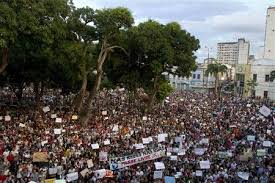By Paul Nicholson and Andrew Warshaw
June 21 – FIFA and Confederations Cup organisers have said the tournament will still continue as protests across Brazil intensified yesterday. World football’s governing body has said in a statement that neither “FIFA nor the LOC (local organizing committee) have ever discussed any such possibility” of cancelling the tournament.
Confederations Cup show will go on, says FIFA and LOC

